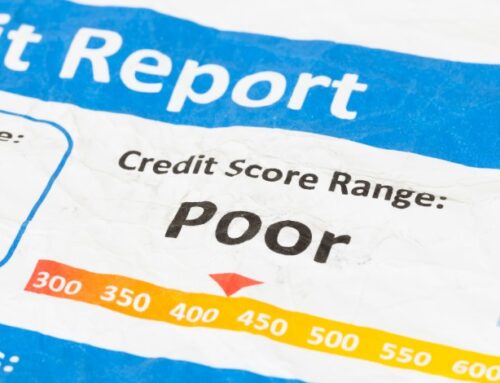Checking your credit score and noticing a small drop can feel discouraging. Individuals can usually pinpoint the specific reason(s) in the sudden drop, but if your activity remains the same, you may be left wondering, why did my credit score go down?
It is common for credit scores to fluctuate by a few points. However, a significant drop of 15 to 20 points should be alarming and worth investigating to find the issue.
You may find that you’ve been a victim of credit report errors or possible identity fraud. In other instances, you may determine the drop results from your actions. Keep reading to discover some factors that play into your credit score calculation to explain why your credit score suddenly dropped.
How Is Your Credit Score Determined?
Before we dive into the potential reasons for a sudden drop in credit score, let’s quickly examine the factors used to determine your credit score. You may have noticed that you have more than one credit score. That is because lenders use two major predictive scoring models to determine the risk of loaning you money.
The most commonly used scoring model is FICO. They claim 90% of the top lenders use FICO scores. Their scoring model is based on the following factors.
- Payment history (35%)
- Amounts owed (30%)
- Length of credit history (15%)
- Credit mix (10%)
- New Credit (10%)
The second most popular credit scoring model is VantageScore. Here are the factors they used to determine your credit score.
- Payment history (40%)
- Age and credit type (21%)
- Credit Utilization (20%)
- Total balances and debt (11%)
- Recent credit behavior and inquiries (5%)
- Available credit (3%)
FICO and VantageScore generally use the same metrics, but the importance of specific factors may be the reason for the slight discrepancies between the two scores.
Why Did My Credit Score Go Down When Nothing Changed?
Unfortunately, your credit score may drop due to factors you can’t control. However, those instances are more of a rarity than a commonality. Often, changes in your overall credit activity influence your credit score more than you may realize.
Let’s delve into some of the potential reasons for the sudden dip in your credit score, even though you may not feel like your behavior changed.
Credit utilization changed drastically
One of the main reasons your credit score may have dropped significantly is an increase in your credit utilization ratio. The credit utilization ratio refers to the amount of credit used compared to how much credit is available. Credit utilization is a subset of the amounts owed factor in the FICO scoring model.
If you have used your credit card more lately, your credit utilization may have increased, which could be one of the reasons your credit score dropped suddenly. For example, if you have a credit card with a limit of $10,000 per month and you use $4,500, your credit utilization ratio would be 45%.
A good rule of thumb to use when thinking about credit utilization is consistently keeping it between 10% and 30%. If possible, the lower, the better.
If you’ve analyzed your credit report and determined that your credit utilization rate is the main reason for the drop, it’s nothing to be too alarmed about. Maintaining a ratio between 10% and 30% should improve your credit score within a month.
However, if you feel that you’re going to be using your credit card more often, you can request an increase in the card’s limit, which may help with your overall utilization rate.
Credit limit decreased
A credit card issuer may lower your credit limit at any time without notifying the user. While the credit card company is not required to alert you to a limit decrease, they generally notify you within 45 days of any changes to your account’s terms and conditions.
Credit card companies will determine your credit limit based on your credit score, income and credit utilization ratio.
A decreased credit limit will not negatively affect your credit score, but this ties into the last point with your credit utilization ratio.
Using the figures above, your original limit was $10,000, and you typically spend $4,500 on your credit card per month. Your credit utilization ratio at that point is 45%, which is higher than the recommended amount. Now, if your credit card company decreased your limit by $2,000, and your balance remained at $4,500, it would increase your credit utilization ratio to 56% ($4,500/$8,000).
If you are in this type of situation, you may want to contact the lender to discuss why your limit was decreased and if they could potentially increase the limit. If that doesn’t work, an alternative would be to pay down the current balance.
An account was closed or paid off
According to a 2019 Credit Card Insider survey, nearly 30% of individuals polled believed that closing a credit account will improve your credit score. That is a popular misconception, and closing an account will hurt your score.
Closing an account affects your credit score because it will decrease the average age of all your accounts. Lenders like to see that you have a long history of making on-time payments. Generally, the older the account, the greater chances of having a higher score.
Furthermore, paying off an installment loan such as a mortgage, student loan or auto loan can result in a sudden drop in your score. That is because you’ll have one less credit account in your name.
Credit mix is important because it provides lenders with a general idea of how you manage multiple debts simultaneously. This shouldn’t prevent you from paying off your debts as soon as possible. Credit mix is one of the less significant factors. It won’t take too long for your score to recover.
You initiated a hard inquiry
There are two different types of inquiries—hard and soft. A soft inquiry or soft credit check generally occurs when an individual or company checks your credit history for a background check. A hard inquiry or hard credit check generally occurs when a lender, credit card issuer or other financial institution checks your credit history when making a lending decision.
A soft inquiry will have no affect on your credit score and will be reported as a soft credit check. On the other hand, hard inquiries will temporarily negatively affect your credit score.
Some of the most common examples of hard inquiries include:
- Mortgage applications
- Credit card applications
- Applying for student loans
- Personal loan applications
- Applying for an auto loan
- Applying for an apartment rental
One hard inquiry will cause your credit score to drop suddenly, but several hard inquiries within a brief period, such as four per year, may cause significant issues when applying for new lines of credit.
Derogatory marks on your credit report
Derogatory marks on your credit report are often due to the borrower not paying a loan based on the agreement. Some of the more common reasons why the credit card issuer may have put a derogatory mark on your credit report include:
- Late payment(s)
- An account sent to collections
- Foreclosure
- Bankruptcy
- Lawsuit
- Tax lien
Derogatory marks are generally harder to get off your credit report. While hard inquiries may take two years, a derogatory mark will usually remain on your report for seven to potentially 10 years. That means your credit score may be negatively affected by a derogatory mark for nearly a decade. However, as time goes on, the derogatory mark has significantly less effect on your credit score.
Errors occurred on your credit report
Instances of inaccurate information on your credit report are not as uncommon as you may believe. According to a recent Consumer Reports investigation, more than a third or 34% of participants discovered at least one error on their credit report. Furthermore, credit report errors are one of the more common issues that the Consumer Financial Protection Bureau deals with daily.
Some of the common credit report errors include:
- Identity errors
- Includes but are not limited to the wrong name, address or phone number
- Account may belong to someone else with the same name
- Incorrect account information due to identity theft
- Inaccurate reporting of account status
- Closed accounts may be reported as open accounts
- Reported as the owner rather than an authorized user of the account
- Inaccurate reporting of late or delinquent payments
- Wrong date of last payment, date opened or date of first delinquency
- Same debt listed multiple times
- Debt management errors
- Input errors after the information was corrected
- Accounts listed multiple times with different creditors
- Balance errors
- Inaccurate current balance
- Incorrect credit limit
So, how do you correct an error on your credit report? As a credit user, you have the right to dispute any information you believe is inaccurate with the credit bureaus and the reporting lender. They are required to investigate any disputes free of charge. If inaccuracies are confirmed, they must immediately correct the information.
It’s always important to periodically check your credit report for potential errors. According to the Federal Trade Commission, you legally are required one free copy of your credit report every 12 months.
To receive a free copy of your credit report, visit annualcreditreport.com or if you’re an Arizona Central Credit Union member, use the SavvyMoney tool to obtain your free comprehensive credit report.
You were a victim of identity theft
The worst scenario, and possibly the most terrifying reason your credit score suddenly took a nosedive, is that you fell victim to identity theft. While it may seem scary, there is no reason to panic. You can take actionable steps to recover your account and reverse the damage created by the impostor.
The first step to recognizing identity theft is through credit monitoring. You should keep an eye on your credit score and credit reports. That will help you notice anything out of the ordinary faster than periodically checking your account.
If you’ve fallen victim to credit card fraud, you should establish a recovery plan. Placing a fraud alert on your credit file should be the first course of action. You can place a fraud alert on your credit file by contacting one of the three national credit bureaus. Once you’ve contacted one of the bureaus, the other two will be automatically notified.
The next step is to file an identity theft report with the FTC. From there, you can start disputing inquiries on your report if you deem it necessary.
Learn More About Your Credit Score
Credit scores are an important metric when you are ready to make a large purchase such as a house or car. They are also influential when applying for additional credit cards, applying for an apartment or applying for additional loans.
Do you want to learn more about credit and credit scores? Check out some of our recent blog posts where we delve into various aspects of establishing and building credit.
- How Your Credit Score is Determined: The Main Deciding Factors: Millions of Americans have a credit score, but many don’t know what affects their credit scores. This article breaks down the main factors that determine your credit score.
- How to Build Up Your Credit from Scratch: Credit is an integral part of your financial health as an adult. This article discusses the best methods to build credit from scratch.
- How to Improve Your Credit Score: Top Five Strategies: Learn how to take care of and raise your credit score. Also, find out the contributing factors that go into the credit score calculation.
- Credit Card Fraud Prevention: Best Strategies to Keep You Secure: Credit card fraud is a significant issue in the United States. Learn how you can prevent yourself from becoming victimized.




